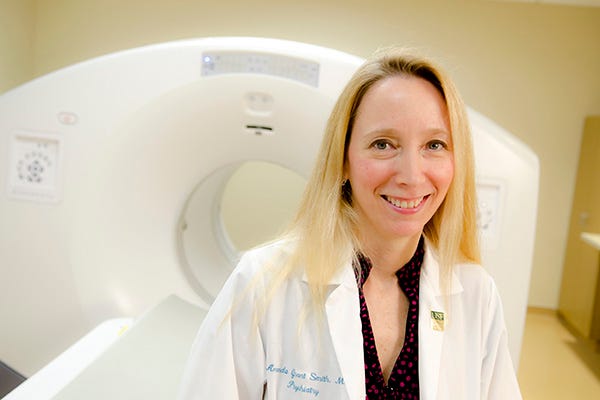Citizen Scientist nominee, Florida State Representative Matt Willhite, from GAP-Net site JEM Research Institute, speaks about his mother’s Alzheimer’s diagnosis and involvement in Biogen’s clinical trial.
Surprise and skepticism greeted the Biogen company’s announcement that clinical trials of an antibody called aducanumab were resuming this year.
Not only that, Biogen asked the federal Food and Drug Administration to give expedited approval to the antibody treatment that targets amyloid plaque in the brains of people with dementia.

Biogen had stopped earlier drug trials in March 2019, saying the results weren’t as promising as hoped.
Patients in clinical trials at University of South Florida Byrd Alzheimer’s Center and JEM Headlands in Atlantis, among many nationwide, stopped getting infusions of what for some was antibody and for others an inactive placebo.
Then, last fall, the company said longer-term review of results indicated it had moved too fast in relegating aducanumab to the long list of dementia drugs that have been tried and failed. A new trial has begun.
This is unusual, even in the up-and-down world of dementia research, where dreams of success rise and explode like bubbles in champagne.
Dr. Mark Goldstein, neurologist and chief principal investigator at JEM Headlands, said it was the “first time in my considerable experience” doing memory research that a trial stopped and restarted the way this one has.

He said he and many of his patients are pleased to see it restart.
The new trial, called EMBARK, is intended to gather more information on aducanumab’s effectiveness and safety. It’s being done solely with patients who were in prior aducanumab trials.
Those patients were in a double-blind trial that didn’t let them or the research doctors know who got what. This time, all patients will get the antibody.
The Food and Drug Administration agreed in August to accept the company’s application for the drug and, if possible, do an expedited review, Biogen said.
“It is an exciting development,” said Dr. Amanda Smith, psychiatrist and clinical research director for Byrd Alzheimer’s Center in Tampa.
What’s the difference?
Drugs now on the market just treat symptoms, she explained. This one targets and removes brain amyloid, plaque, one of two significant brain abnormalities associated with Alzheimer’s disease.

The other one is abnormal versions of tau, a protein meant to help neurons in the brain perform properly.
By removing amyloid plaque, there’s believed to be a chance of meaningfully changing the course of the disease.
“The data they have submitted includes proof that it both removed the amyloid fairly safely and also helps reduce cognitive decline,” Smith said.
It isn’t a complete cure, both physicians said, but it would attack one of the destructive processes associated with Alzheimer’s, providing the potential to stave off memory loss and preserve daily functioning.
If approved, Goldstein said, “it would be the first approved medication for slowing the progression of cognitive decline in people in the spectrum of Alzheimer’s disease.”
Mary Willhite, who spent years working at Bethesda Memorial Hospital in Boynton Beach, is among those hoping for its approval.
So is her son, State Rep. Matt Willhite, 49.

He and his wife began noticing his mother, now 72, wasn’t remembering things as easily as she had before. Doctors diagnosed her as being in the “early cognitive memory disorder umbrella,” he said
Mary Willhite took part in an earlier aducanumab trial, in which her son said they “really believe” the drug was having some positive effects.
When it was terminated, she enrolled in a trial of another drug. After that study, she joined the new aducanumab study, said Willhite, D-Wellington Beach.
Both said she’s done well and hasn’t had troubling side effects
Being the patient is a different experience for the retired licensed practical nurse.
“It’s been interesting,” she said. “I’m enjoying this.”
The path ahead
For aducanumab or any drug, FDA acceptance of an application and agreement to review it doesn’t guarantee approval.
If approved, there’s delay before it’s widely available.
Reasons include a need for strict guidelines, insurance coverage and the need for a reliable, cost-effective test.
The test could be one of the blood biomarkers validated to look for abnormalities like excessive amyloid, Smith said.
Several studies presented in July at the Alzheimer’s Association International Congress described advances in blood tests that appear capable of detecting Alzheimer’s disease through biological markers that detect abnormal versions of tau in blood or plasma.
Those tau brain changes also can indicate amyloid plaque accumulation, the association said.
Without an inexpensive test being available, Smith said, people would need a PET scan or an invasive spinal tap to confirm they have abnormalities.
There also will need to be a medical protocol to monitor abnormalities in imaging that can occur when amyloid is removed, she said.
Willhite, like the researchers, encourages people who have Alzheimer’s or are at higher risk of having it to look into clinical trials.
He and State Rep. Scott Plakon, R-Longwood, have worked together on bipartisan legislation to increase funding of dementia care and research.
“They can replace your heart,” Willhite said. “The brain is the one thing you can’t replace.”
Originally posted by The Ledger on September 1, 2020.
